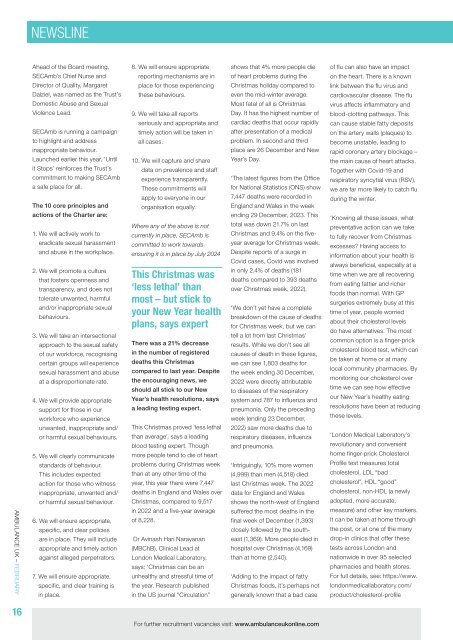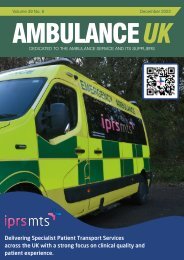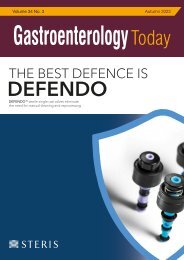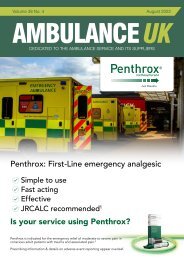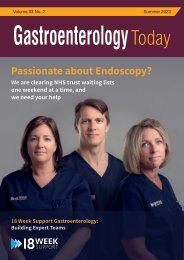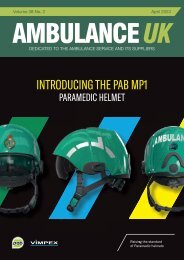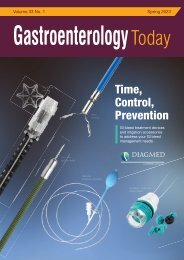Ambulance UK February 2024
You also want an ePaper? Increase the reach of your titles
YUMPU automatically turns print PDFs into web optimized ePapers that Google loves.
NEWSLINE<br />
NEWSLINE<br />
AMBULANCE <strong>UK</strong> – FEBRUARY<br />
Ahead of the Board meeting,<br />
SECAmb’s Chief Nurse and<br />
Director of Quality, Margaret<br />
Dalziel, was named as the Trust’s<br />
Domestic Abuse and Sexual<br />
Violence Lead.<br />
SECAmb is running a campaign<br />
to highlight and address<br />
inappropriate behaviour.<br />
Launched earlier this year, ‘Until<br />
it Stops’ reinforces the Trust’s<br />
commitment to making SECAmb<br />
a safe place for all.<br />
The 10 core principles and<br />
actions of the Charter are:<br />
1. We will actively work to<br />
eradicate sexual harassment<br />
and abuse in the workplace.<br />
2. We will promote a culture<br />
that fosters openness and<br />
transparency, and does not<br />
tolerate unwanted, harmful<br />
and/or inappropriate sexual<br />
behaviours.<br />
3. We will take an intersectional<br />
approach to the sexual safety<br />
of our workforce, recognising<br />
certain groups will experience<br />
sexual harassment and abuse<br />
at a disproportionate rate.<br />
4. We will provide appropriate<br />
support for those in our<br />
workforce who experience<br />
unwanted, inappropriate and/<br />
or harmful sexual behaviours.<br />
5. We will clearly communicate<br />
standards of behaviour.<br />
This includes expected<br />
action for those who witness<br />
inappropriate, unwanted and/<br />
or harmful sexual behaviour.<br />
6. We will ensure appropriate,<br />
specific, and clear policies<br />
are in place. They will include<br />
appropriate and timely action<br />
against alleged perpetrators.<br />
7. We will ensure appropriate,<br />
specific, and clear training is<br />
in place.<br />
8. We will ensure appropriate<br />
reporting mechanisms are in<br />
place for those experiencing<br />
these behaviours.<br />
9. We will take all reports<br />
seriously and appropriate and<br />
timely action will be taken in<br />
all cases.<br />
10. We will capture and share<br />
data on prevalence and staff<br />
experience transparently.<br />
These commitments will<br />
apply to everyone in our<br />
organisation equally.<br />
Where any of the above is not<br />
currently in place, SECAmb is<br />
committed to work towards<br />
ensuring it is in place by July <strong>2024</strong><br />
This Christmas was<br />
‘less lethal’ than<br />
most – but stick to<br />
your New Year health<br />
plans, says expert<br />
There was a 21% decrease<br />
in the number of registered<br />
deaths this Christmas<br />
compared to last year. Despite<br />
the encouraging news, we<br />
should all stick to our New<br />
Year’s health resolutions, says<br />
a leading testing expert.<br />
This Christmas proved ‘less lethal<br />
than average’, says a leading<br />
blood testing expert. Though<br />
more people tend to die of heart<br />
problems during Christmas week<br />
than at any other time of the<br />
year, this year there were 7,447<br />
deaths in England and Wales over<br />
Christmas, compared to 9,517<br />
in 2022 and a five-year average<br />
of 8,228.<br />
Dr Avinash Hari Narayanan<br />
(MBChB), Clinical Lead at<br />
London Medical Laboratory,<br />
says: ‘Christmas can be an<br />
unhealthy and stressful time of<br />
the year. Research published<br />
in the US journal “Circulation”<br />
shows that 4% more people die<br />
of heart problems during the<br />
Christmas holiday compared to<br />
even the mid-winter average.<br />
Most fatal of all is Christmas<br />
Day. It has the highest number of<br />
cardiac deaths that occur rapidly<br />
after presentation of a medical<br />
problem. In second and third<br />
place are 26 December and New<br />
Year’s Day.<br />
‘The latest figures from the Office<br />
for National Statistics (ONS) show<br />
7,447 deaths were recorded in<br />
England and Wales in the week<br />
ending 29 December, 2023. This<br />
total was down 21.7% on last<br />
Christmas and 9.4% on the fiveyear<br />
average for Christmas week.<br />
Despite reports of a surge in<br />
Covid cases, Covid was involved<br />
in only 2.4% of deaths (181<br />
deaths compared to 393 deaths<br />
over Christmas week, 2022).<br />
‘We don’t yet have a complete<br />
breakdown of the cause of deaths<br />
for Christmas week, but we can<br />
tell a lot from last Christmas’<br />
results. While we don’t see all<br />
causes of death in these figures,<br />
we can see 1,803 deaths for<br />
the week ending 30 December,<br />
2022 were directly attributable<br />
to diseases of the respiratory<br />
system and 787 to influenza and<br />
pneumonia. Only the preceding<br />
week (ending 23 December,<br />
2022) saw more deaths due to<br />
respiratory diseases, influenza<br />
and pneumonia.<br />
‘Intriguingly, 10% more women<br />
(4,999) than men (4,518) died<br />
last Christmas week. The 2022<br />
data for England and Wales<br />
shows the north-west of England<br />
suffered the most deaths in the<br />
final week of December (1,393)<br />
closely followed by the southeast<br />
(1,369). More people died in<br />
hospital over Christmas (4,169)<br />
than at home (2,540).<br />
‘Adding to the impact of fatty<br />
Christmas foods, it’s perhaps not<br />
generally known that a bad case<br />
of flu can also have an impact<br />
on the heart. There is a known<br />
link between the flu virus and<br />
cardiovascular disease. The flu<br />
virus affects inflammatory and<br />
blood-clotting pathways. This<br />
can cause stable fatty deposits<br />
on the artery walls (plaques) to<br />
become unstable, leading to<br />
rapid coronary artery blockage –<br />
the main cause of heart attacks.<br />
Together with Covid-19 and<br />
respiratory syncytial virus (RSV),<br />
we are far more likely to catch flu<br />
during the winter.<br />
‘Knowing all these issues, what<br />
preventative action can we take<br />
to fully recover from Christmas<br />
excesses? Having access to<br />
information about your health is<br />
always beneficial, especially at a<br />
time when we are all recovering<br />
from eating fattier and richer<br />
foods than normal. With GP<br />
surgeries extremely busy at this<br />
time of year, people worried<br />
about their cholesterol levels<br />
do have alternatives. The most<br />
common option is a finger-prick<br />
cholesterol blood test, which can<br />
be taken at home or at many<br />
local community pharmacies. By<br />
monitoring our cholesterol over<br />
time we can see how effective<br />
our New Year’s healthy eating<br />
resolutions have been at reducing<br />
these levels.<br />
‘London Medical Laboratory’s<br />
revolutionary and convenient<br />
home finger-prick Cholesterol<br />
Profile test measures total<br />
cholesterol, LDL “bad<br />
cholesterol”, HDL “good”<br />
cholesterol, non-HDL (a newly<br />
adopted, more accurate,<br />
measure) and other key markers.<br />
It can be taken at home through<br />
the post, or at one of the many<br />
drop-in clinics that offer these<br />
tests across London and<br />
nationwide in over 95 selected<br />
pharmacies and health stores.<br />
For full details, see: https://www.<br />
londonmedicallaboratory.com/<br />
product/cholesterol-profile<br />
Welsh <strong>Ambulance</strong><br />
Service using robots<br />
to byte down on<br />
repetitive tasks<br />
THE Welsh <strong>Ambulance</strong> Service<br />
is using robots to help run its<br />
behind-the-scenes operations.<br />
The Trust is using Robotic<br />
Process Automation (RPA)<br />
technology to perform timeconsuming<br />
administrative tasks<br />
to free up staff to focus on tasks<br />
that add the most value.<br />
The use of software robots, or<br />
‘digital workers,’ is saving time and<br />
allowing colleagues to harness<br />
their skills more appropriately.<br />
Jonny Sammut, the Trust’s<br />
Director of Digital, said: “It’s been<br />
a long-held ambition to use RPA<br />
technology, so we’re thrilled to be<br />
taking our first steps into it.<br />
proactmedical.co.uk<br />
“This is not about replacing<br />
humans with robots – it’s about<br />
automating those repetitive and<br />
low-value tasks so that staff can<br />
focus their skill and expertise on<br />
the things that really matter.<br />
“While the corporate staff who<br />
perform these tasks aren’t<br />
patient-facing, they support<br />
those who are, and anything<br />
which improves our efficiency<br />
behind-the-scenes means that<br />
patients will eventually reap the<br />
benefit too.”<br />
The Trust secured funding from<br />
Welsh Government’s Digital<br />
Priorities Investment Fund in<br />
March 2022 to explore RPA<br />
technology.<br />
To date, it has been used across<br />
five separate projects, including a<br />
project to streamline the creation<br />
of ICT accounts for new recruits.<br />
Almost 900 accounts have been<br />
created robotically since October<br />
2022, freeing up ICT analysts to<br />
apply their technical expertise to<br />
more complex issues.<br />
The technology is also being<br />
used by the team who produce<br />
investigation reports in response<br />
to complaints, inquests and<br />
serious incidents.<br />
A once-manual trawl of logs<br />
to establish a timeline of what<br />
happened has been replaced by<br />
an automatic process, increasing<br />
the capacity of the team by an<br />
average 36 hours per week and<br />
allowing investigating officers<br />
to focus on tasks where human<br />
judgement is essential.<br />
Leanne Smith, Assistant Director<br />
of Digital Services, said: “Taking<br />
away the pain of repetitive,<br />
laborious tasks to enable our<br />
people to use their knowledge<br />
and expertise on high-value tasks<br />
It’s time to choose accuracy.<br />
Not just a Pulse Oximeter.<br />
is what this is all about.<br />
“This is our first foray into<br />
automation but already<br />
colleagues are saying that<br />
it’s improving the workplace<br />
experience and boosting morale.<br />
“It’s an exciting time, and we<br />
look forward to scaling up in the<br />
coming years.”<br />
Meanwhile, the Trust is<br />
collaborating with the University<br />
of York to train the next<br />
generation of artificial intelligence<br />
(AI) professionals.<br />
The <strong>UK</strong>RI AI Centre for Doctoral<br />
Training (CDT) in Lifelong Safety<br />
Assurance of AI-Enabled<br />
Autonomous Systems (SAINTS)<br />
will welcome its first students<br />
next year.<br />
Nigel Rees, Assistant Director<br />
of Research and Innovation at<br />
the Welsh <strong>Ambulance</strong> Service,<br />
CLASS IIB<br />
MEDICAL DEVICE<br />
AMBULANCE <strong>UK</strong> – FEBRUARY<br />
16<br />
17<br />
For further recruitment vacancies visit: www.ambulanceukonline.com<br />
For further recruitment vacancies visit: www.ambulanceukonline.com


